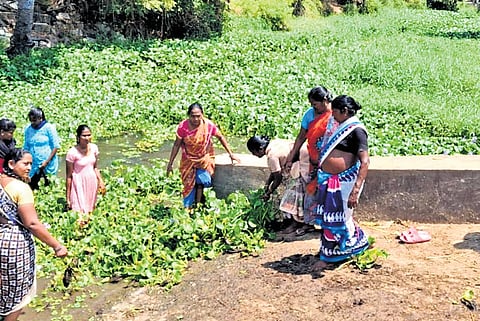

VIJAYAWADA: In a pioneering initiative, the West Godavari district administration has launched a water hyacinth composting project, the first of its kind in the state, to address environmental concerns while promoting sustainable agriculture.
The project, involving women from Self-Help Groups (SHGs), transforms the invasive aquatic weed into nutrient-rich organic fertiliser, creating both ecological and economic benefits.
Implemented in Siddapuram (Akiveedu Mandal), Gollavanithippa (Bhimavaram mandal), and the Krishi Vigyan Kendra (KVK) in Undi, the initiative not only improves water flow in irrigation canals but also provides rural women with a new source of income.
West Godavari District Collector Chadalawada Nagarani, who spearheaded the project, emphasised its dual impact. “The excessive growth of water hyacinth in irrigation canals is obstructing water flow. By converting it into fertiliser, we are not only addressing this issue but also turning it into a valuable resource,” she told TNIE.
Encouraging industrial participation in the project, she presented the initiative to Chief Minister N Chandrababu Naidu during the collectors’ conference, highlighting its economic and environmental significance.
The composting model is designed for economic sustainability, with a single unit capable of producing five metric tonnes (MT) of compost annually.
With compost selling at Rs 10 per kg, each unit can generate Rs 50,000 in revenue, yielding an annual profit of Rs 39,500 after expenses. The district administration aims to expand the project to other regions facing similar challenges, positioning it as a cost-effective, eco-friendly alternative to chemical fertilisers while empowering rural women.
For the Self-Help Groups (SHGs) members, the initiative has been life-changing. Lakshmi, a participant from Siddapuram village, shared her experience, “Earlier, water hyacinth was just a nuisance, clogging our canals and making our work difficult. Now, it’s helping us earn a livelihood. This project has given us a way to clean our villages while making organic fertiliser that farmers value.” Farmers, too, are intrigued by the transformation of this once-troublesome weed into a beneficial agricultural input. Agricultural scientists affirm that hyacinth compost is nutrient-rich, improving soil fertility and crop yields without the harmful effects of chemical fertilisers.
The initiative follows a similar environmental conservation effort in Krishna district, where water hyacinth was converted into eco-friendly handicrafts with the support of national award-winning artisan Rita Das from Assam.
Now, under Nagarani’s leadership, West Godavari is demonstrating how an environmental challenge can be turned into an opportunity for both economic growth and sustainable farming.